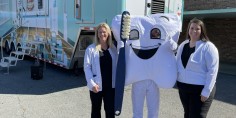
Stacy Warren is the Endowment's Associate Director of the Health Care program area.
According to the Children’s Health Fund, 28 percent of children under age 18 (20.3 million) in the United States, do not have access to essential health services.[1] Some of the causes of disparities in access are financial, such as lack of health insurance. Others are non-financial, such as lack of transportation or the unavailability of necessary health information. In rural areas, the disparities are compounded by an insufficient number of providers. (More than 14 million children live in designated Health Professional Shortage Areas.)
Schools provide unique opportunities to address gaps in access to health care. Students spend a large part of their day at school, so school-based services don’t require extra travel. In addition, schools can offer a familiar setting with trusted staff who make it more likely that students will take advantage of health services when offered. For these reasons and more, expanding school-based health has been a topic of interest and investment for The Duke Endowment’s Health Care program area for the past decade. Over the years, we have explored different opportunities for connecting students to health services in school settings, and have applied what we’ve learned along the way.
A New Approach to Oral Health
Dental care represents a significant gap in access to services. In fact, The Pew Charitable Trusts reports that “according to data reported by the Centers for Medicare and Medicaid Services, about half of the children enrolled in Medicaid did not see a dentist in 2019.”[2] Our first endeavor to support the development and expansion of school-based health services was an exploration of models for sustainable oral health programs. Along with our partners at the Medical University of South Carolina and East Carolina University, we learned that sustainability was a consistent challenge for most school-based oral health programs. Therefore, we saw an opportunity to supply such programs with training and technical assistance to apply sustainable practices to their clinical and financial operations.
In partnership with the late Dr. Mark J. Doherty DMD, MPH, CCPH, founder of Commonwealth Mobile Oral Health Services in Boston, the Endowment supported the creation of a 15-component curriculum that helps those designing and planning school-based oral health initiatives understand the ins and outs of building relationships with schools, developing operational systems that work within a school, and creating viable and sustainable business plans.
In 2018, along with co-funders Blue Cross and Blue Shield of North Carolina and BlueCross BlueShield of South Carolina we launched the first of five “readiness and planning” cohorts of 10 grantees. By 2023, 48 participants had gone through this program, and their work has spread to more than 350 schools in North Carolina and South Carolina with more than 20,000 children receiving prevention and/or treatment services.
During this effort, we learned a lot about working with schools as well as more about working with health departments and Federally Qualified Health Centers (FQHCs), which deliver the oral health services at school sites. In particular, this work emphasized the value of building relationships with multiple partners and the importance of investing time and funding for networking and mentoring to help build trust, nurture ideas and support collaborative efforts.
Using Learnings to Expand Telehealth
As our work and learning around school-based oral health grew, so did our interest in further addressing gaps in access through school-based telehealth. In 2021, we supported the establishment of The Carolina School-Based Telehealth Learning Collaborative. This multi-state learning community brings together health care, education and nonprofit leaders with a shared mission: to promote student success by keeping young people healthy in schools. By sharing knowledge, resources and strengths, the collaborative can help new telehealth programs launch successfully and become sustainable. Currently 15 organizations are participating in this collaborative, providing telehealth services to more than 200 schools and rapidly expanding.
Addressing Student Mental Health
The lessons we’ve learned in the delivery of school-based oral care and telehealth are now helping us better understand how we might work alongside our partners to address the crisis of children’s mental health and well-being. According to the CDC, nearly one in five children have a behavioral, emotional or mental health disorder, but fewer than 20 percent of these children receive professional care.[3] Building from the network of telehealth partners, we are working to improve school-based access to mental health services – from psychiatry to therapy – with a focus on prevention. Because these telehealth providers already have done the legwork of building relationships with schools and operationalizing their service delivery in ways that work seamlessly within school environments, they are now trusted providers, which will make it easier to expand.
The Endowment also is exploring ways to help our partners become voices for shaping state policy on school-based mental health. We are supporting the work of the School Mental Health State Policy Academy, which has developed a framework for school-based mental health and is starting a multi-state policy academy. We will host the first meeting of the academy in July 2024, which will include several of our North Carolina and South Carolina partners.
Throughout our work, we continue to look for opportunities, learn from them and apply those lessons to help further mitigate gaps in health care access.
[1] Unfinished Business: More than 20 Million Children in U.S. Still Lack Sufficient Access to Essential Health Care, Children’s Health Fund, 2016



